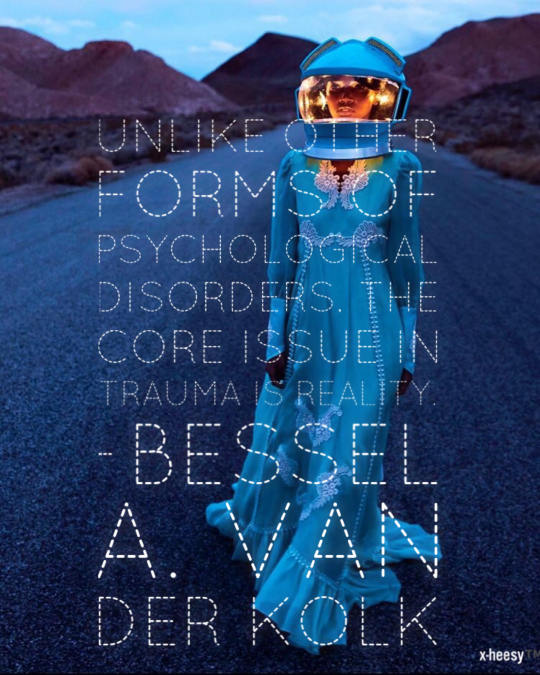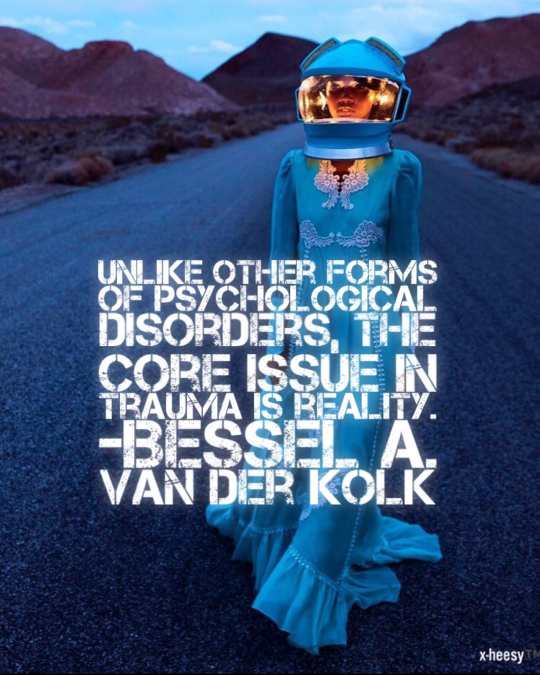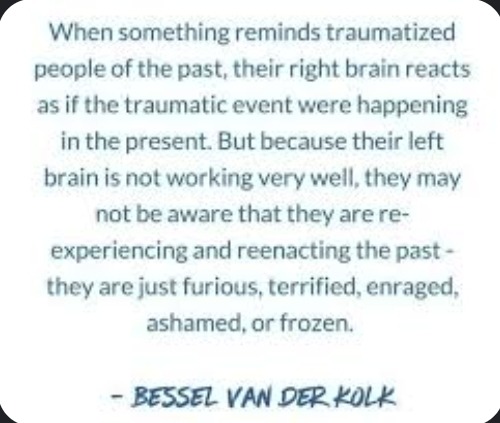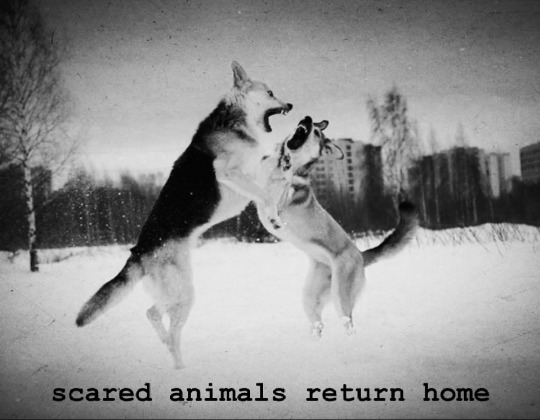#Bessel A van der Kolk
Text









„𝚂𝚘𝚞𝚕 𝙲𝚊𝚗𝚌𝚎𝚛“
𝚄𝚗𝚕𝚒𝚔𝚎 𝚘𝚝𝚑𝚎𝚛 𝚏𝚘𝚛𝚖𝚜 𝚘𝚏 𝚙𝚜𝚢𝚌𝚑𝚘𝚕𝚘𝚐𝚒𝚌𝚊𝚕 𝚍𝚒𝚜𝚘𝚛𝚍𝚎𝚛𝚜, 𝚝𝚑𝚎 𝚌𝚘𝚛𝚎 𝚒𝚜𝚜𝚞𝚎 𝚒𝚗 𝚝𝚛𝚊𝚞𝚖𝚊 𝚒𝚜 𝚛𝚎𝚊𝚕𝚒𝚝𝚢. -𝙱𝚎𝚜𝚜𝚎𝚕 𝙰. 𝚟𝚊𝚗 𝚍𝚎𝚛 𝙺𝚘𝚕𝚔
𝙶𝚒𝚖𝚖𝚎 𝚊 𝚂𝚎𝚌𝚘𝚗𝚍 𝚋𝚢 𝚂𝚊𝚕𝚒𝚟𝚊 𝙶𝚛𝚎𝚢 🎧

#!!!#Bessel A. van der Kolk#Bessel A van der Kolk#x-heesy#my art#artists on tumblr#for me and my mum#3/2024#mental health#anxiety#depression#trauma#soul cancer#you are loved#you are not alone#iphone art#fancy dress#astronaut#pop art#neo pop art#now playing#music and art#contemporaryart
14 notes
·
View notes
Text
"Clinicians and researchers who deal with people with histories of chronic trauma are routinely confronted with fight, flight, ore freeze reactions. Our patients (and occasionally colleagues) easily take offense, and they often disorganize their (and our) lives by becoming too angry, too ashamed, and too frozen. Minor irritations easily turn into catastrophes; small failures of communication are difficult to gloss over and easily turn into dramatic interpersonal conflicts...human kindness...often fails to have a significant impact on the despair, rage, and terror of people with histories of trauma and abandonment.... Gradually we came to understand that the most severe dysregulation occurred in people who, as children, lacked a consistent caregiver. Emotional abuse, loss of caregivers, inconsistency, and chronic misattunement showed up as the principal contributions to a large variety of psychiatric problems (Dozier, Stovall, & Albus, 1999; Pianta, Egeland, & Adam, 1996). One of the most important discoveries in psychology, neuroscience, and psychiatry has been that failure in establishing secure early attachment bonds leads to a diminished capacity to regulate negative emotions.... Sadly, deficient affect regulation caused by early adverse experiences is compounded by the resulting off-putting behaviors in the face of stress, such as temper tantrums and emotional withdrawal (Shaver & Mikulincer, 2002). Dysregulated behavior alienates potential friends and partners and interferes with being able to garner support and accumulate restorative experiences. Lack of affect regulation thus runs the danger of becoming a vicious circle, where deficient self-control leads to abandonment, which in turn makes it even more difficult to regulate the negative mood states."
from The Polyvagal Theory: Neurophysiological Foundations of Emotions, Attachment, Communication, and Self-Regulation by Stephen W. Porges, Foreward by Bessel A van Der Kolk
#polyvagal theory#Bessel A van der Kolk#Stephen W. Porges#psychology#pysiology#psychiatry#mental health#emotions#nervous system#self help#depression#communication#bipolar#borderline personality disorder#ADHD#CPTSD#PTSD#chronic trauma#abandoned#psychosomatic#psychophysiology#physiological psychology#sympathetic nervous system#parasympathetic nervous system#enteric nervous system#eating disorder#pills#self diagnosis#autism#childhood trauma
5 notes
·
View notes
Text

“Scared animals return home, regardless of whether home is safe or frightening”
Bessel Van Der Kolk from The Body Keeps Score
150 notes
·
View notes
Text

i haven't even finished this book
#jun.log#like yes it's a good book re: understanding how to come to terms with your trauma#and is an extremely useful tool for clinicians and anyone working in the field of psychology#but also it makes me so ANGRY#the body keeps the score#psychology#psychiatry#bessel van der kolk
718 notes
·
View notes
Quote
Traumatized people chronically feel unsafe inside their bodies: The past is alive in the form of gnawing interior discomfort. Their bodies are constantly bombarded by visceral warning signs, and, in an attempt to control these processes, they often become expert at ignoring their gut feelings and in numbing awareness of what is played out inside. They learn to hide from their selves.
Bessel van der Kolk, The Body Keeps the Score: Brain, Mind, and Body in the Healing of Trauma
1K notes
·
View notes
Text
Thought this was a really good quote, so here I am sharing it.

#words of wisdom#quotes#trauma#trauma quotes#childhood trauma#bessel van der kolk#this helps#a lot#especially now#since i'll be an adult next year
72 notes
·
View notes
Note
can you say more about the way van der kolk conceptualizes trauma/our response to it & with what aspects you take issue?
it's been a minute since i read 'the body keeps the score' but my recollection is what irritated me was a continual invocation of pop-neurosci explanations that basically sought to exonerate people of moral culpability for their 'trauma responses' by presenting these things as quirks of biology that are mechanically driven, out of their control, &c. think like, the idea of the 'lizard brain'—rudimentary neurological architecture that responds to fear or threats on a more 'primitive' level than the outermost, higher-consciousness-producing anatomy. besides the fact that this builds on basically a recapitulationist read of evolution (meaning like, 'ontogeny recapitulates phylogeny' à la haeckel)—and the political valences of such discourses about 'primitiveness' or 'primordial organs' or vestiges / atavisms—besides all this, which is a whole different post, this type of explanation of trauma or any other psychological phenomenon is infuriating because it takes for granted the presumed dichotomy within which something can be 'biological' (mechanical, out of your control, not your fault) OR it can be 'psychological' (a spiritual / conscious / immaterial phenomenon that you are responsible for; your fault).
there's no room here for any further nuance, for example along the lines of "your psychological response / pain / suffering is not your fault regardless of whether there's a biological mechanism that 'explains' it, and regardless of whether we can ever find or 'fix' such a thing" or, "psychological phenomena can be biologically instantiated without being biologically caused", &c & so forth. i think van der kolk appeals to a lot of people because the dominant medico-psychiatric paradigms can't help them, and then blame them for having 'recalcitrant' problems or being 'non-compliant'. so to have someone like van der kolk saying "actually, it's not your fault, you really are suffering, and it's out of your control" is very appealing and sells a lot of books. but fundamentally his work operates within the same paradigm as doctors who will just blame you for your own suffering if they can't fix it with pills or diet; van der kolk just takes the opposite stance within this therapeutic model, and this is why he so often has to invoke really shitty, oversimplified, outdated or simply not evidence-backed models of neurology and psychology because they feel intuitively true and validating. again my position here isn't defending neurologists or psychiatrists; it's the opposite. i disagree with this whole paradigm, with the false binary between 'neurobiology' and 'things we consciously control', & with the idea that an experience being biologically or neurologically instantiated automatically means it is mechanically caused or can be mechanically 'treated'.
61 notes
·
View notes
Text
It is one thing to process memories of trauma, but it is an entirely different matter to confront the inner void – the holes in the soul that result from not having been wanted, not having been seen, and not having been allowed to speak the truth.
"The Body Keeps the Score: Mind, brain and body in the transformation of trauma" - Bessel van der Kolk
#book quotes#the body keeps the score#bessel van der kolk#nonfiction#trauma#trauma processing#inner void#void#soul#unwanted#unseen#truth#speak your truth
154 notes
·
View notes
Text

“-regardless of whether home is safe or frightening”
#actuallyabused#bessel van der kolk#traumacore#ventcore#angercore#abused dogs#dog identity#canine identity#bad dog aesthetic#quote is from the body keeps the score#traumatizedjaguar
16 notes
·
View notes
Text

#the body keeps the score#bessel van der kolk#nonfiction#book poll#have you read this book poll#polls
28 notes
·
View notes
Text

the body keeps the score // bessel van der kolk
16 notes
·
View notes
Text

trauma is the ultimate experience of “this will last forever.”
Bessel Van Der Kolk from The Body Keeps The Score
#bessel van der kolk#the body keeps the score#actuallytraumatized#ok to rb#trauma#traumacore#ventcore#actuallymentallyill#actuallyabused#mental health
83 notes
·
View notes
Text
“I was desperate for help, but as I stood there, I felt very deeply that I would only be hurt even more. And that might well have been true. Of course, I had to hide what had happened from my parents—and from everyone else.”
After I told her that I was concerned about what was going on with her, she wrote me another e-mail: “I’m trying to remind myself that I didn’t do anything to deserve such treatment. I don’t think I have ever had anyone look at me like that and say they were worried about me, and I am holding on to it like a treasure: the idea that I am worth being worried about by someone I respect and who does understand how deeply I am struggling now.”
In order to know who we are—to have an identity—we must know (or at least feel that we know) what is and what was “real.” We must observe what we see around us and label it correctly; we must also be able trust our memories and be able to tell them apart from our imagination. Losing the ability to make these distinctions is one sign of what psychoanalyst William Niederland called “soul murder.” Erasing awareness and cultivating denial are often essential to survival, but the price is that you lose track of who you are, of what you are feeling, and of what and whom you can trust.
— Bessel van der Kolk, from The Body Keeps The Score
40 notes
·
View notes
Quote
Understanding what is 'wrong' with people currently is more a question of the mind-set of the practitioner (and of what insurance companies will pay for) than of verifiable, objective facts...The preamble to the DSM-III warned explicitly that its categories were insufficiently precise to be used in forensic settings or for insurance purposes. Nonetheless it gradually became an instrument of enormous power: Insurance companies require a DSM diagnosis for reimbursement, until recently all research funding was based on DSM diagnoses, and academic programs are organized around DSM categories [...] The manual has become a virtual industry that has earned the American Psychiatric Association well over $100 million. The question is: Has it provided comparable benefits for the patients it is meant to serve?
Bessel van der Kolk, The Body Keeps the Score: Brain, Mind, and Body in the Healing of Trauma
179 notes
·
View notes
Text

For some people it can be hard to receive love because of their childhood experiences, that’s why when it comes they push it away.
.
.
#bessel van der kolk#unloved#unworthy of love#childhood trauma#childhood programming#feelings#the body keeps the score
60 notes
·
View notes
Text

Thank you Anthony Dominick Benedetto. You’ve made our hearts sing with passion for a long, long time.
* * * *
“Life teaches you how to live it — if you live long enough.”
― Tony Bennett
+
“Feeling listened to and understood changes our physiology; being able to articulate a complex feeling, and having our feelings recognized, lights up our limbic brain and creates an “aha moment”. In contrast, being met by silence and incomprehension kills the spirit. Or, as John Bowlby so memorably put it: “What can not be spoken to the [m]other cannot be told to the self.””
— Bessel Van Der Kolk, “The Body Keeps the Score: Brain, Mind and Body in the Healing of Trauma
#Tony Bennett#quotes#R.I.P.#mother#listening#being understood#physiology#John Bowlby#Bessel Van Der Kolk#The Body Keeps the Score: Brain Mind and body in the Healing of Trauma
19 notes
·
View notes